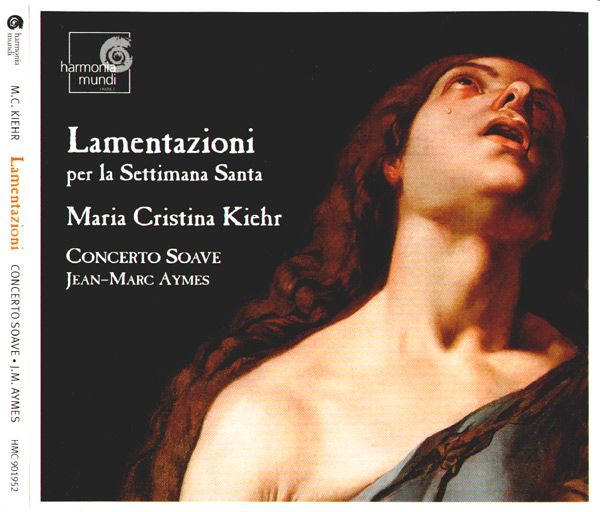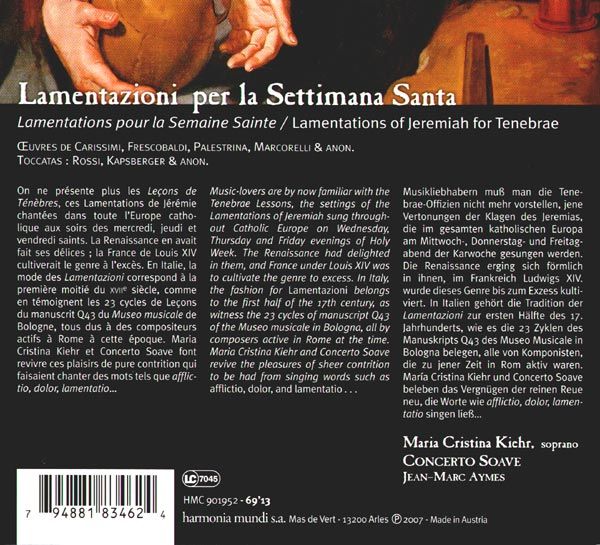 |
|
Lamentazioni per la Settimana Santa
Label: Harmonia Mundi
Year: 2007
Performers:
Maria Cristina Kiehr - soprano
Jean-Marc Aymes - claviorganum
Ensemble:
Concerto Soave (period instruments)
Conductor:
Jean-Marc Aymes
Music-lovers are by now familiar with the Tenebrae Lessons, the settings of the Lamentations of Jeremiah sung throughout Catholic Europe on Wednesday, Thursday and Friday evenings of Holy Week. The Renaissance had delighted in them, and France under Louis XIV was to cultivate the genre to excess. In Italy, the fashion for Lamentazioni belongs to the first half of the 17th century, as witness the 23 cycles of manuscript Q43 of the Museo musicale in Bologna, all by composers active in Rome at the time. Maria Cristina Kiehr and Concerto Soave revive the pleasures of sheer contrition to be had from singing words such as afflictio, dolor, and lamentatio . . .
The sacred music on this disc - settings of texts for Holy Week, from the early seventeenth century and influenced by the new monodic style - has long been less familiar than the fiery secular music of the era. One may admire this recording by Argentine-born Baroque specialist Maria Cristina Kiehr and still understand why that is: the composers included here, several of them very famous names, offer a rather scaled-down version of operatic monody to fulfill the requirements of church music, even when it came to the profound Lamentations of Easter week. The holy Wednesday, Thursday, and Friday mentioned (in French) in the tracklist are actually, if you were wondering, Thursday, Friday, and Saturday; apparently there was a tradition of designating such works, which were sung at Matins services, with the name of the previous day. The overall sound of this recording has a shimmering, slightly diffuse quality, with the basic sound laid down by the triple plucked strings of the continuo group (harp, archlute/chitaronne, and lirone) and emphasized by the use of the rare claviorganum organ-harpsichord hybrid. But the real attraction is Kiehr's voice. It is pure, spiritually intense, somewhat piercing, yet extremely graceful, and although it achieves some very agile effects as it shifts from register to register, it doesn't change much from work to work. This seems to be intentional (Kiehr has sounded quite different on other recordings), with the intention being to create a meditative effect. To this end, Kiehr is kept at a distance from the microphone; if you approach the recording expecting to be up close to the singer as is usual with early Baroque opera, you get something quite different, and rather haunting. Variety is provided by the insertion of instrumental pieces, including one unusual one by Palestrina. The recording certainly fills a hole in the overall recorded repertoire of sacred music.
The long history of musical settings for the Office of Tenebrae during Holy Week found particular resonance in 17th-century Italy and France. In France, no self-respecting composer of sacred music failed to produce at least one setting, while in Italy the intensity of emotion inherent in the texts, above all those drawn from the Lamentations of Jeremiah, proved an ideal expressive vehicle for several generations of composers reared on the doctrine of affetti. Add to this the love of melancholy a word with more elevated meaning than it has today that pervaded the philosophy of the period, and an explanation for the ubiquity of Tenebrae settings becomes clear.
The present disc draws from this tradition with works by a group of composers working in Rome during the first half of the 17th century. All the vocal pieces share in common their provenance: Manuscript Q 43, housed in the Civico Museo music library in Bologna. In addition, the disc includes a number of instrumental works of the kind that may also have been employed in Tenebrae services, the choice sensitively made to fit in with the overall mood of the disc.
One of the features of Lamentations settings is the retention of the Hebrew incipits (Aleph, Beth, and so on) that preface each section, present here is all but the final anonymous setting for Holy Saturday, a through-composed piece of monody in a style familiar from many 17th-century narrative works. It is in fact not strictly speaking part of the Lamentations, but the deeply distressed prayer of Jeremiah that forms the final chapter (5) of the book. While rarely treated to the long melismas favored by some French composers, these incipits form the most melodic part of the works concerned, which are otherwise dominated by monody or recitativo cantando, the heightened recitative familiar from the operas of Monteverdi and his immediate successors. The key, to a greater or lesser degree, is an apparent restraint highlighted by a syllabic setting that only rarely allows for ornamental flourishes. Yet this deceptive restraint disguises a latent fervor and passion that is inherent in all this music, where the indivisible relationship between words and music is reflected by the constant rise and release of tension.
Few singers today understand the conventions of the repertoire better than Maria Cristina Kiehr, whose voice a rare combination of purity and rich Latin sensuousness is ideally suited to it. But more importantly, Kiehr knows exactly how to express affetti without a hint of mannerism or affectation, subtly coloring her voice to bring an acute sensibility to texts, allowing them to make their point with natural spontaneity. One need only listen to the first of the Carissimi Lessons, where the incipits are exquisitely shaped as they are throughout the disc, to be aware of Kiehr’s consummate artistry. Her infinite concern goes way beyond such obvious painting of the words such as "dolor" or "lachrimae" that pervade these texts. At "non est qui consoletur," there is no doubting that there are indeed none to console her (Jerusalem); in the forlorn heightening of tension at "omnes amici" Kiehr again makes it crystal clear that "all her friends have dealt treacherously with her"; while the words "parvuli eius ducti sunt in captivitium" ("her children are gone into captivity") are delivered with a near imperceptible drop in dynamics that renders them heartrending in their tenderness.
It would be possible but tedious and ultimately superfluous to go through each piece illustrating Kiehr’s supreme artistry in this way. It should, however, be added that she is given splendid support by her usual continuo ensemble, Concerto Soave, whose director Jean-Marc Aymes contributes a magical account of the Michelangelo Rossi Toccata on a copy of an Italian Renaissance claviorganum, a cross between a harpsichord and organ. But it is for the vocal pieces that this CD is so valuable. All the music is of high quality, the performances supreme, and the sound is outstandingly natural. This is indeed one of the major highlights of my listening so far this year, a disc that puts the well-meaning intentions of many current recordings well in the shade.
Tracklist:
01. Giacomo Carissimi - Incipit Lamentatio Ieremiae Prophetae
02. Giacomo Carissimi - Vau. Et egressus est a filia Sion
03. Michelangelo Rossi - Toccata Quarta
04. Girolamo Frescobaldi - Jod. Manum suam
05. Giovanni Pierluigi da Palestrina - Heu mihi Domine, passeggiato per la viola
06. Anonymous - De Lamentatione Ieremiae Prophetae I
07. Anonymous - Lamed. Matribus suis dixerunt
08. Johannes Hieronymus Kapsberger - Toccata Quinta
09. Anonymous - De Lamentatione Ieremiae Prophetae II
10. Anonymous - Toccata arpeggiata
11. Giovanni Francesco Marcorelli - Aleph. Quomodo obscuratum est aurum
12. Anonymous - Incipit Oratio Ieremiae Prophetae


| SPOILER (LOG FILE) |